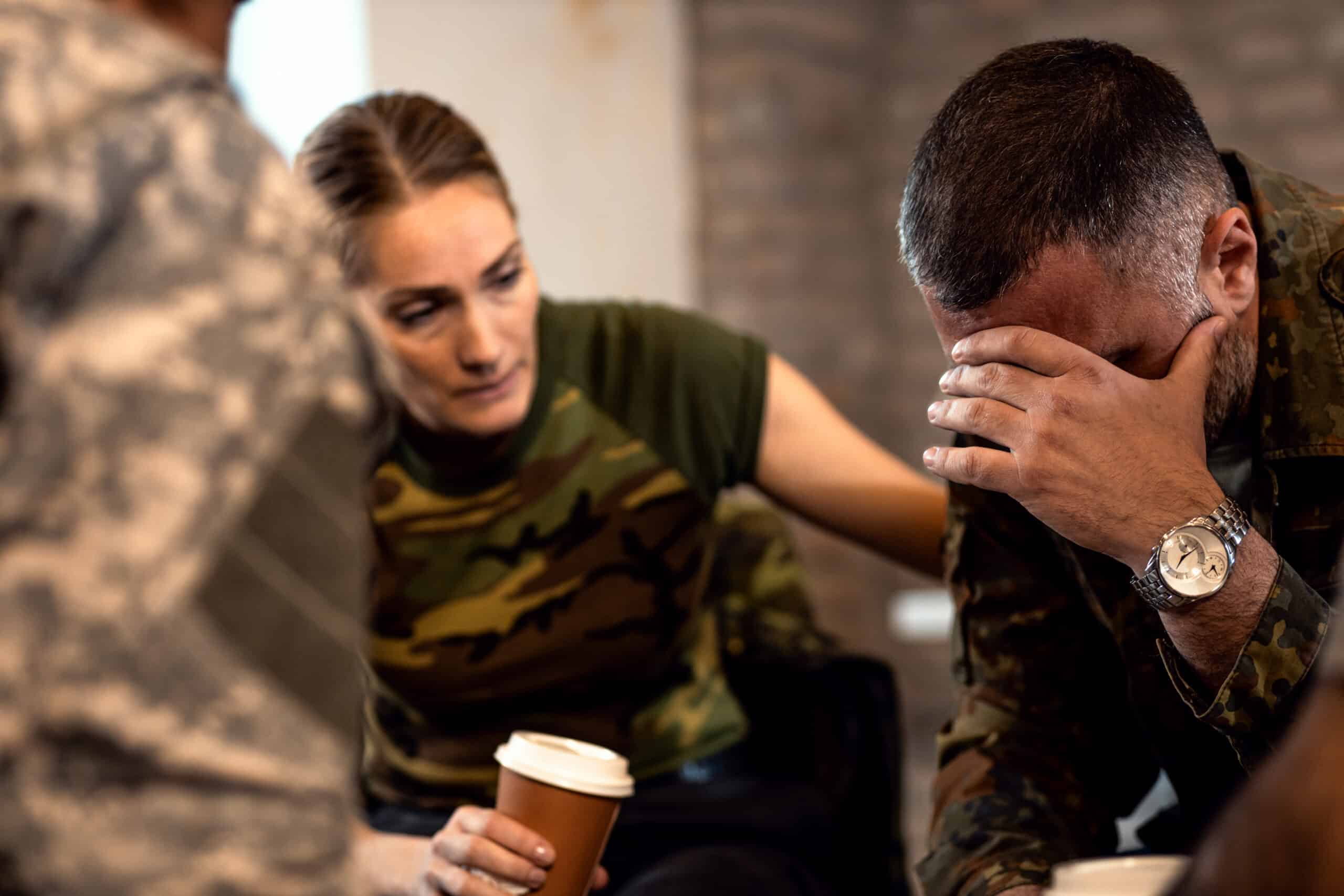Veterans and Depression
- Updated:

At Acera Health, we recognize the unique challenges faced by veterans, who often bear the mental scars of their service. Our dedicated residential and outpatient treatment center is designed to provide specialized care for veterans grappling with mental illness, with a particular focus on veteran depression. Depression among veterans is a critical issue, influenced by factors such as traumatic experiences during service, difficulties in transitioning back to civilian life, and the loss of a supportive military community. According to the 2021 National Veteran Suicide Prevention Annual Report, approximately 17 veterans died by suicide every day in 2019, highlighting the severe impact untreated depression and related mental health issues can have on this population.
Understanding the unique experiences of veterans is crucial for effective treatment. Our specialized programs include trauma-informed care to address veteran PTSD symptoms, veteran peer support to connect with mentors who provide guidance based on shared experiences, employment support for transitioning to civilian jobs, and life skills training to manage daily challenges and reduce veteran anxiety. Our commitment to veterans extends beyond immediate treatment, focusing on long-term recovery and well-being through continuous support and follow-up care. By addressing the underlying issues contributing to depression and providing a robust support network, we empower veterans to lead fulfilling lives.
Understanding Veteran Depression
Veteran depression is a serious and prevalent issue that affects a significant portion of those who have served in the military. According to a RAND report, roughly three-quarters of veterans interviewed who expressed support for extremist groups reported experiencing a negative or traumatic event while in the military, such as interpersonal conflict, combat trauma, or physical and sexual abuse. This highlights how the stress and trauma of military service can significantly impact mental health.
Veterans frequently encounter highly stressful and traumatic situations during their service, including combat exposure and witnessing the death of comrades, leading to lasting psychological scars. Additionally, the transition from military to civilian life can be a complex and challenging, with veterans struggling to find employment, establish a new routine, and reconnect with family and friends. The unemployment rate for veterans, as reported by the U.S. Department of Labor, is often higher than that of non-veterans, exacerbating feelings of inadequacy and depression.
The loss of a support network provided by the military’s tight-knit community can also contribute to feelings of isolation and loneliness, furthering the development of depression. Research indicates that veterans with strong social support networks are significantly less likely to experience severe depression. Furthermore, many veterans return from service with physical injuries leading to chronic pain and disabilities, significantly impacting their mental health.
To cope with emotional and physical pain, some veterans turn to substance abuse, which can exacerbate depression. Addressing veteran depression is critical not only for the individual’s well-being but also for their ability to lead a productive and fulfilling life post-service. Early intervention and comprehensive treatment can significantly improve outcomes, helping veterans manage their symptoms and regain control over their lives. By understanding the underlying causes and providing targeted support, we can help veterans navigate the challenges of depression and achieve long-term recovery.
Causes of Depression in Veterans
Trauma and PTSD: Many veterans experience traumatic events during their service, leading to post-traumatic stress disorder (PTSD). This condition is often accompanied by depression, creating a complex and challenging mental health landscape.
- Transition to Civilian Life: The shift from military to civilian life can be overwhelming. Veterans may struggle with finding employment, rebuilding relationships, and adjusting to a new routine, all of which can contribute to depression. The Bureau of Labor Statistics reports that the unemployment rate for veterans is often higher than that of non-veterans.
- Loss of Comrades: The camaraderie and support network provided by fellow service members can be difficult to replace. The sense of isolation and loneliness after leaving the military can lead to depression. A study published in the Journal of Affective Disorders found that veterans with a strong sense of belonging and social support are less likely to experience depression.
- Physical Injuries: Many veterans sustain physical injuries during their service, leading to chronic pain and disability. The constant struggle with physical limitations can significantly impact mental health. Approximately 30% of veterans suffer from chronic pain.
- Substance Abuse: To cope with their symptoms, some veterans turn to substance abuse. This can exacerbate depression and create a cycle of dependency that is hard to break without professional help. The National Institute on Drug Abuse reports that veterans are more likely than the general population to engage in substance abuse.
Signs and Symptoms of Depression in Veterans
Recognizing the signs of depression is the first step toward seeking help. Depression can manifest differently in veterans compared to the general population, often intertwining with other mental health issues such as PTSD or anxiety. Being aware of these symptoms can help in identifying depression early and seeking appropriate treatment. Symptoms may vary, but common indicators include:
- Persistent sadness or hopelessness
- Loss of interest in activities once enjoyed
- Changes in appetite and sleep patterns
- Fatigue and lack of energy
- Difficulty concentrating or making decisions
- Irritability or anger
- Feelings of worthlessness or guilt
- Thoughts of death or suicide
These symptoms can affect every aspect of a veteran’s life, from personal relationships to professional responsibilities, significantly reducing their quality of life. If you or a loved one is experiencing these symptoms, it is crucial to seek professional help. Depression is a treatable condition, and early intervention can lead to better outcomes. Treatment options such as therapy, medication, and support groups can provide the necessary support to manage and overcome depression.
Our Approach to Treating Veteran Depression
At Acera Health, we offer comprehensive treatment programs designed to address the unique needs of veterans. Our integrated approach combines evidence-based therapies, holistic treatments, and support services to promote recovery and improve quality of life.
Residential Treatment Program
Our residential treatment program provides a safe and supportive environment for veterans to focus on their recovery. Key features include:
- Individual Therapy: Personalized therapy sessions help veterans explore the root causes of their depression and develop coping strategies. Our therapists use a variety of techniques, including cognitive-behavioral therapy (CBT), dialectical behavior therapy (DBT), and trauma-focused therapy.
- Group Therapy: Group sessions provide a sense of community and peer support. Veterans can share their experiences and learn from others facing similar challenges.
- Family Therapy: Involving family members in the treatment process can enhance recovery. Family therapy sessions aim to improve communication, rebuild trust, and strengthen relationships.
- Holistic Treatments: We offer a range of holistic treatments to support mental and physical well-being. These include yoga, meditation, art therapy, and equine-assisted therapy.
- Medical Support: Our medical team provides comprehensive care, including medication management and treatment for co-occurring conditions such as PTSD and substance abuse.
Outpatient Treatment Program
Our outpatient program offers flexible treatment options for veterans who do not require residential care. This program is ideal for individuals transitioning from residential treatment or those seeking support while maintaining their daily responsibilities.
- Intensive Outpatient Program (IOP): Our IOP provides structured support with a focus on relapse prevention and skill-building. Veterans attend therapy sessions several times a week while living at home.
- Partial Hospitalization Program (PHP): The PHP offers a higher level of care than traditional outpatient treatment. Veterans participate in full-day treatment sessions, receiving intensive therapy and support.
Helping a veteran with PTSD involves understanding their condition, offering support, and encouraging them to seek professional help. Acera Health provides resources and guidance on how to help a veteran with PTSD, including educational materials and support groups for families. Creating a supportive environment, encouraging open communication, and being patient and understanding is crucial.
Veteran Depression Treatment at Acera Health
If you or a loved one is struggling with depression, Acera Health is here to help. Our experienced and compassionate team is ready to provide the comprehensive support and personalized treatment needed to overcome veteran depression and achieve lasting recovery. We offer a wide range of specialized programs designed to address the unique challenges veterans face, ensuring each individual receives the care they deserve. Contact us today to learn more about our specialized programs and services and take the first step toward a brighter and healthier future for you or your loved one.
Clinically Reviewed by:

Melody Stone, LMFT
Melody Stone is a Licensed Marriage and Family Therapist who has over 17 years of experience in the field of behavioral health. She works as the Chief Clincal Officer (CCO) to Acera Health, where she is a strong leader focused on sustainable success.
Related Resources

Veterans and Anxiety
Veterans and Anxiety Reviewed by: Melody Stone Anxiety is a prevalent mental health concern among veterans, often stemming from the unique and challenging experiences encountered

PTSD Symptoms in Veterans
PTSD Symptoms in Veterans Reviewed by: Melody Stone Post-traumatic stress disorder (PTSD) is a prevalent mental health condition that significantly affects many veterans who have

How to Help a Veteran with PTSD
How to Help a Veteran with PTSD Reviewed by: Melody Stone Helping a veteran with PTSD is essential as they navigate life after deployment. Statistics

Understanding Suicide & Veterans: Why Do Veterans Commit Suicide?
Understanding Suicide & Veterans Reviewed by: Melody Stone In addressing the complexities of suicide among veterans, it’s essential to recognize the interplay of various factors.




